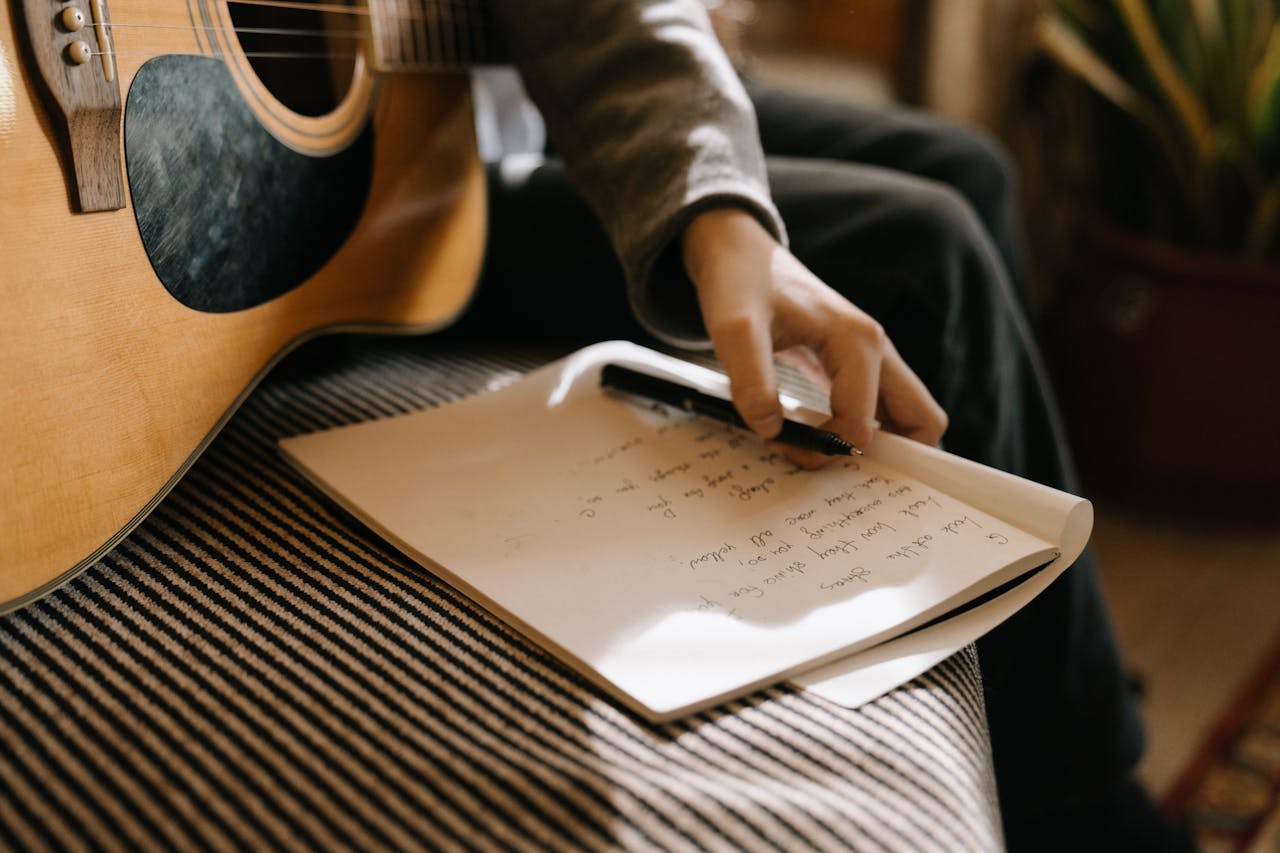The challenge started on a quiet Sunday night. I sat in my room with my guitar resting against my leg, staring at a blank notebook page. I had decided, without a clear plan or safety net, that for the next thirty days, I would write one complete song every single day. No skipping. No excuses. No perfectionism stalling my progress.
By the time I put down my pen on day thirty, I wasn’t just a better songwriter. I was a more disciplined artist, a more confident creator, and a more honest storyteller. This is what I learned from writing a song every day for 30 days, and why the experience reshaped the way I approach music.
Starting Without Overthinking
On day one, I had a burst of inspiration and finished my first song in under an hour. It wasn’t perfect, but it had a hook I liked and a melody that stuck in my head. By day three, I realized I couldn’t wait for inspiration every time. Some days, I simply wasn’t in the mood to write. My head felt heavy, my ideas felt thin, and my energy was low. But the rule was clear: a song a day, no matter what.
I quickly learned that overthinking was my biggest enemy. If I sat too long debating the “right” chord progression or lyric, I’d lose momentum. So I gave myself permission to start messy. Even if the first line felt awkward or the chorus didn’t seem strong, I kept moving forward.
Learning to Work Through Creative Resistance
By the end of the first week, the initial excitement had faded. I would come home after a long day, look at my instrument, and feel like I had nothing left to give. But here’s what surprised me, once I started playing a few chords, something always came out. It might not have been brilliant, but it was something I could build on.
This taught me that creative resistance is usually strongest right before you start. Once I pushed through that initial wall, my brain would open up. Even on my worst days, I found ways to complete the task. That persistence spilled into other areas of my life, making me more proactive about things I would normally procrastinate on.
Experimenting With Styles and Genres
One of the best parts of the challenge was giving myself the freedom to explore. On some days, I leaned into acoustic ballads with simple chord progressions. On others, I dabbled in funk rhythms, pop hooks, or even a touch of blues.
Because I had to produce a new song daily, I didn’t have time to stick to my comfort zone. This led me to try odd time signatures, unconventional rhyme schemes, and melodies that wandered outside my usual range. Some experiments were disasters, but others led to breakthroughs that I still use in my music today.
Accepting Imperfection
Before this challenge, I often abandoned songs halfway because they didn’t sound “good enough.” But writing a song every day forced me to finish, even if I knew the song wasn’t a masterpiece.
Finishing taught me two valuable things: first, that completion matters more than constant revision during the creation phase; and second, that some songs I thought were weak turned out to have strong moments I could later refine. In fact, a few of my best songs from the challenge came from days when I felt the least inspired.
Building Emotional Honesty
Writing daily made me more honest with myself. It’s hard to fake emotion thirty days in a row. Some mornings, I woke up frustrated or anxious, and those feelings slipped into my lyrics. Other days, I was joyful, and the melodies reflected that.
By the end, I noticed that my songs had more raw, unfiltered emotion. This honesty made the music feel more alive, and it helped me connect deeper with the meaning behind each piece. I stopped writing what I thought people wanted to hear and started writing what I actually felt.
The Value of a Creative Routine
Before this, I would write sporadically, sometimes weeks would pass without me touching an instrument. During the challenge, I had to carve out a daily writing slot. I experimented with morning sessions before work, lunchtime scribbles in a coffee shop, and late-night bursts of creativity.
I discovered that my most productive time was in the evening, about an hour before bed. Once I found that sweet spot, I stuck to it. Having a set time each day made songwriting feel less like a random act and more like a non-negotiable part of my routine.
How Discipline Fueled Creativity
At first, I thought forcing myself to write would kill creativity. I assumed the songs would start sounding repetitive or lifeless. But the opposite happened. The daily habit sharpened my instincts. I got faster at finding chord progressions, quicker at spotting lyrical patterns, and better at editing on the fly.
I realized that discipline doesn’t limit creativity, it builds the foundation for it. By showing up every day, I trained my brain to enter creative mode faster. I stopped waiting for the “perfect” moment and learned to create in any mood or setting.
Finding Themes in My Writing
As the days went on, I noticed certain themes appearing in my lyrics without me consciously planning them. Loneliness, nostalgia, self-discovery, and resilience kept showing up in different forms. Some songs were personal, others fictional, but the underlying messages often mirrored my own thoughts at the time.
This was an unexpected benefit of the challenge, it acted like a mirror, reflecting my inner state through my songwriting. By the end of the thirty days, I had a body of work that told a story I didn’t even know I was telling.
The Power of Constraints
One rule I set for myself was that each song had to be original and at least two minutes long. I also decided that I couldn’t recycle melodies or lyrics from past work. These constraints might seem restrictive, but they actually made the process easier.
When you have unlimited possibilities, it’s easy to get overwhelmed. But with clear boundaries, I knew exactly what I had to work with. This allowed me to focus my energy on making the best song possible within the set parameters.
Recording as I Went
I didn’t just write the songs, I recorded rough demos each day. They weren’t polished productions, but they captured the essence of each piece. Listening back now, I can hear the progression in my playing, singing, and overall confidence.
Some recordings make me cringe, but others remind me of moments where I broke through a creative block. Having these audio snapshots is like keeping a diary, except in music form.
What Happened After the Challenge
When the thirty days were over, I had thirty songs in my catalog. Not all of them were ready for release, but several had real potential. I spent the following months refining and re-recording the best ones. Two of them eventually became singles, and one even landed me a small licensing opportunity.
Beyond the tangible results, the challenge left me with a sense of accomplishment I had never felt before. I proved to myself that I could commit to a creative goal and follow through, even when motivation dipped.
How It Changed My Relationship With Music
Before, I saw songwriting as something magical that only happened when inspiration struck. Afterward, I saw it as a skill I could develop through consistent practice. Of course, inspiration still plays a role, but I learned that craft, discipline, and persistence are just as important.
Now, even outside of challenges, I write more frequently. Some weeks I’ll write three songs, others just one, but I never go long without putting pen to paper.
Advice for Anyone Considering This Challenge
If you’re thinking about trying something like this, here’s what I’d suggest:
- Set clear rules for yourself and stick to them.
- Don’t aim for perfection, aim for completion.
- Keep your tools ready so you can start quickly.
- Experiment with styles and themes.
- Record your work, even if it’s just on your phone.
Most importantly, commit to finishing each song. You’ll be surprised by how much your creativity grows when you have no option but to keep going.
The Biggest Takeaway
What I learned from writing a song every day for 30 days is that creativity is a muscle. The more you use it, the stronger it becomes. At the start, I thought I might run out of ideas, but instead, I ended up with more than I could use.
The process taught me that my biggest limitations were in my head. Once I removed the fear of writing something “bad,” I opened the door to writing something great. And even when the songs weren’t amazing, they were still valuable steps in my growth as a songwriter.
Looking Back, Looking Forward
I’ve thought about doing the challenge again, maybe expanding it to sixty days or focusing on specific genres. I know it won’t be easy, but I also know the rewards are worth it. This experience didn’t just give me songs, it gave me confidence, discipline, and a deeper love for the craft.
Music has always been my outlet, but now it’s also my daily practice. And every time I pick up my guitar, I remember those thirty days and the lessons they brought me. It reminds me that inspiration isn’t something you wait for, it’s something you meet halfway by showing up every day.

